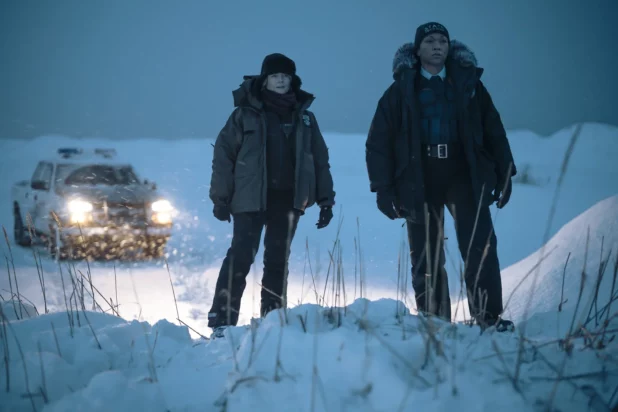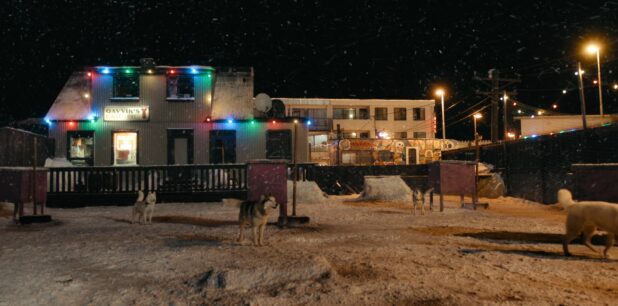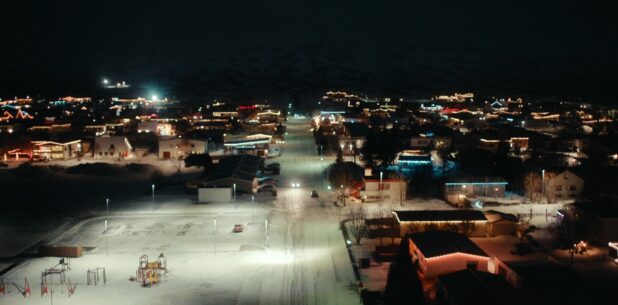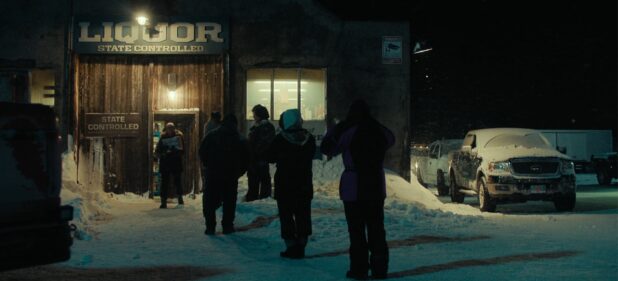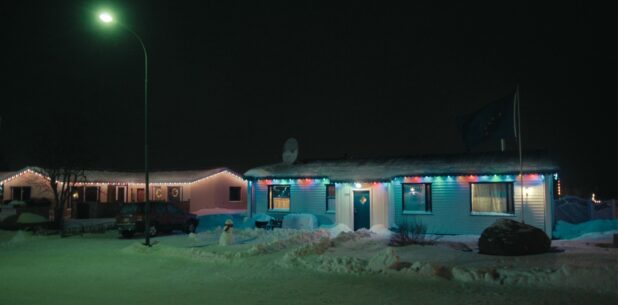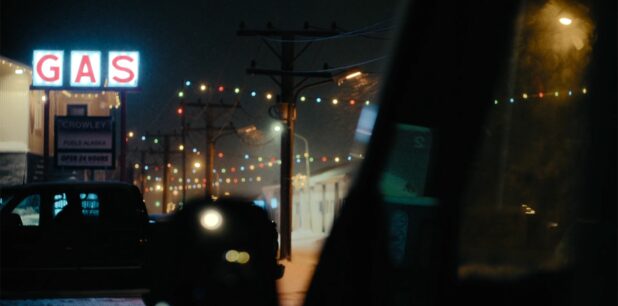Since the dawn of ultra-politicized media over the last several years, I’ve become obsessed with the claim I’ve repeatedly made that there is no reason that media with political themes I find reprehensible has to necessarily be bad art.
I can certainly understand why someone wouldn’t want to watch something that was pushing a political agenda they are repulsed by, but as an artist, I will always separate themes from form and style. The assumption has become that in fact, everyone who believes in this woke bullshit is a moronic diversity hire with no innate talent.
Still, if I have the time, I will watch or read critically acclaimed media created by leftists to see if someone has made something that is actually good. This has become a quest. The Hunt for the Great Woke Whale.
After watching the first episode of HBO’s True Detective 4: Night Country, I thought that I’d maybe found the mythical beast. This is a feminist show, explicitly. The writer/director, a Mexican woman named Issa Lopez (who is apparently an accomplished filmmaker in Mexico, something that literally no one cares about), stated in interviews that this was a feminist response to the first (and only good) season of the show, which aired a decade ago.
The show starts out very strong. I was shocked. From the haunting opening credits scene, featuring one of my favorite Billie Eilish songs, until the discovery of the bodies at the end, I was feeling it. I was fully ready to believe in these magical women who have the powers of men.
It is visually stunning. The cinematography is incredible, clearly almost all shot on location. (The show had a budget of $60 million, so you get what you pay for.) The mixing of the perfectly selected music with the scenery of Alaska (most of it was actually filmed in Iceland) is beautiful. All of the sets are perfect, with the houses all looking exactly as you would expect the houses of poor rural Alaskans to look, yet also being hauntingly kino in a way that poor people’s homes never are in real life. I couldn’t tell if they actually built the arctic research center or if it was CGI (HBO is the set-builder, but even they’ve been moving away from it in recent years), but the lovingly imagined base was done up as an homage to both The Thing and Alien. Everything feels very cold, dead, eerie. The mixing of huge long shots of the frozen waste with lingering shots of busted-up shops, huddled Eskimo peasants and their huskies, and flickering lighting apparatuses blinking on the snow was joyous.
Jodie Foster is a believable character, in terms of being an old whore Karen. Watching her, I thought: “Very few men could write a woman this accurately.” Of course, she has magical man-like analytical abilities, but in the biz, we call accepting that unbelievable element as a part of the story’s world “suspension of disbelief.” The Mexican Monster woman, Kali Reis, a former boxer playing an Eskimo, does really lag behind Foster in a way that is regularly awkward, but I did initially believe the character as “cunty, masculinized, entitled brown slut.” At first sight, all of the supporting characters are interesting.
The setup for the horror/mystery tale was totally adequate. Episode one did everything a first episode should do: I was fully intrigued, and wanted to know more about the setting, the story, the characters, and how it would all clash and turn into the psychological nightmare that the series title promises.
Unfortunately, the entire thing quickly collapses in on itself, in a manner that almost appeared as if it was intended to evoke farce. At time of writing, I’ve watched all five of the episodes that are currently available, and I can confirm: this show is garbage, and the final episode is obviously going to make it much worse.
Throughout, the visuals remain stunning, I should note. The heavy establishing shot panning between every scene makes it feel like a nature documentary at points. Frankly, I’m not really sure how much of that is on the director these days. I assume she had very little to do with the cinematography, let alone the editing (in fact, a brief look at the credits seems to confirm that it was Olfers, Krisjans, and Bjorns responsible for the astonishing visuals). But credit where due, the spectacle almost makes the show worth watching. The sheer aesthetic really makes you want to move to Alaska and kill yourself.
The characters go from gruff and nasty people who we’re sure must have some depth to gruff and nasty people who have nonsensical motivations in place of depth. This serious storytelling flaw, which could have been easily corrected, is hand-waved away by claiming the spooky town makes everyone insane, and therefore there is no reason for their behavior to make sense. In fact, if everyone is insane, with motivations that do not make sense, then you have vulgar dadaism, not a hardboiled detective/psychological horror story.
The detective story itself, as a basic piece of genre fiction, is complete garbage. The promising premise quickly falls apart when the show fails to introduce meaningful clues as to where the story is going. The writers seemed to be completely oblivious to the basic nature of the genre, and view it as “a series of shocking surprises,” rather than an unfolding tapestry of connections that the viewer is supposed to be making himself. This structure of “shocking surprises” as a stand-in for a real development of a mystery leads to increasingly stupid surprises, played up for pornographic emotional intensity, again at the expense of the characters making any sense. If you’re going to have shocking, horrific moments, you need to build up to them, or you might as well be making a Blumhouse-Netflix jump scare gore porno. Mixing the ostensibly highbrow and allegedly philosophical tone of True Detective with cheap shlock is a kind of vandalism.
I question whether the show contains anything “philosophical” at all, though it may be that women would view it as such. The underlying theme of the show (beyond female strength and male weakness, and the evil of corporations) is that everyone is forever alone and life is an endless hell of personal suffering. Everyone is dying, everyone experiences nothing but pain and hatred. Also there are ghosts for some reason. But actually, the ghosts are just a symbol for how everything is miserable (but also they are real ghosts). They did a good enough job showing that life is miserable through the attitudes and behaviors of the miserable characters that it was redundant to reinforce that with generic jumpy scenes of ghosts. If the supernatural stuff has no purpose in the story, it would have better been left out completely. As far as I can tell, this show has actual, confirmed ghosts, which are intended to be a real world element of the story, and not simply a result of the decaying mental health of the characters – while at the same time, within the thematic world, they are meant to be symbolic.
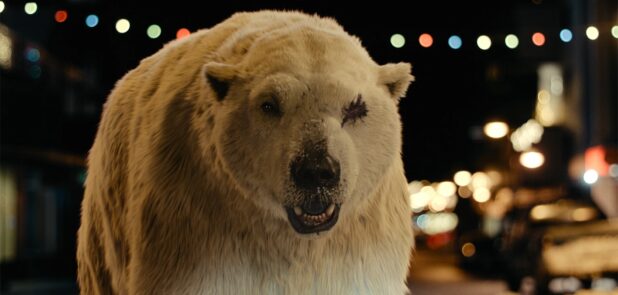
By episode 4, it had fully set in that the pacing was botched, and nothing was really happening other than people being miserable and nasty while walking around finding ghosts popping out of the woodwork, so they decided to start introducing fantastical, nonsensical developments just to get things moving. Episode 5 is so perplexing that one wonders if it is some type of meta-level commentary on poor storytelling.
This is without even bothering to mention the sheer number of elements clearly intended as plot points that are totally dropped without mention in a way that was so sloppy it was almost unbelievable. Someone should have gone back and edited this stuff out if they weren’t going to use it. Again, I’ve not watched the last episode – maybe it will magically bring all of this together – but as it stands now, the show has built an entire research facility of stockpiled Chekov’s guns, catalogued and marked, unfired.

If these people would have sent me the script, I could have overhauled it and fixed everything, and made it a good story. There was enough there. The production values were so high, the cinematography so gorgeous, the actors totally competent, but the creatives failed the project, abjectly.
Unfortunately, Night Country is not good media. Going through all the elements of a literary story (themes, characters, plot, setting, conflict), the only one that is passable is the setting, and there are issues with that as well (many of the pointless ghost gibberish would qualify as elements of the setting). It’s a triumph of spectacle, but many things are these days. Technology has enabled most projects with multimillion dollar budgets to create visually stunning worlds (further, the people working on this are as much technicians as creatives, and they are not beholden to politics).
Again, we are left wondering if everyone who believes in the woke ideology is so intellectually bankrupt that it is impossible for them to create quality storytelling. As we know, there is much storytelling throughout history that is both leftist and high quality. However, regardless of your worldview, it’s an objective reality that leftism was never as absurd and cartoonish as it has become in the last decade. The believers in this ideology, who seem to be the only people who are hired by media corporations, are psychologically defective in a way that makes them incapable of understanding what a story is supposed to be. In place of storytelling, we get spectacle, often pornographic in nature, dumb, extreme characters who engage in confusing emotionally unhinged behavior, and kooky, corny plot pivots in place of traditional plot progression and character development.
There are no new ways to tell a story. The elements of a story are no different than the elements of food. You can make up food in a lot of novel and interesting ways, but you are still eating the macros of protein, fats, and carbohydrates, while hopefully ensuring to cover your micros. Peak fiction was probably reached by Aristophanes and Sophocles, but it was definitely completed by William Shakespeare (who, interestingly, viewed himself as simply copying the Greeks). You can experiment with aesthetics and other elements of style, but you’re ultimately going to have to conform to norms if you want to tell a good story. In the 20th century, we saw attempts to “deconstruct” storytelling, with “experimental literature” that “challenged conventions.” Unsurprisingly, the movement ended up, like abstract art, being framed as “a response to fascism,” i.e., “fuck you, dad.” If you had an inadequate father, you must look at him as having failed to live up to what he was supposed to be. You cannot completely dismiss the concept of the father, because then you are dismissing God, and you have put yourself on a road to becoming an abstract artist or an experimental literary figure (not to mention becoming dominated by women or becoming a submissive homosexual).
Ultimately, both Jean-Paul Sartre and Albert Camus, the two giants of the French Marxist movements from which literary deconstructionism emerged, were forced to admit that the natural form of storytelling was non-negotiable. If they’d have lived long enough, the natural conclusion of this realization would have been to forgive their parents and accept Jesus Christ as their Lord and Savior.
Please also note that Marvel Cinematic Universe films, while obviously garbage, tend to rigidly conform to the traditional rules of storytelling, which is obviously why they’ve been so popular. They are dumbed down children’s stories, lacking themes beyond vague notions of humanism, but they follow the rules. (Or, at least they did – I’ve not watched any of the recent ones.)
The universe has laws that go beyond those of the natural sciences. The definite and objective nature of beauty is one of these laws, and the structure of a fiction story is arguably an aspect of the nature of beauty. Maybe, it is something deeper than that, a more complex reflection of the soul, or the spirit of God within us. The fact that “challenging conventions in literature” is a satanic and anti-human act should have been evident when David Foster Wallace offed himself. Surprisingly, I’m not aware of a single literary critic who used Wallace’s humiliating suicide as a chance to reflect on the abomination that is modern literature.
These important facts about the nature of fiction having been briefly explained, we must now note that it’s unclear that any of this is directly relevant to the garbage that is modern fiction media. With Night Country, it appeared as though the writers would have put together a real story if they had the ability. It seems that these writers and the writers of the rest of these horrible films and shows are simply incapable of understanding what a story is supposed to be. The trash that has been pumped out in the literary world for the last hundred years presumably muddies the waters, muddles the brains of the writers, as they consume through the course of their lives both real stories and “convention challenging” garbage, but there is no evidence that Night Country was intended as “experimental.” It seems instead that it is just bad. These people are obsessed with promoting an ideology, and therefore, they are likely to try to do so in the most effective way possible, which would be through good storytelling. They just can’t do it.

